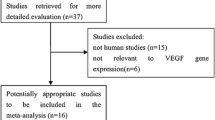Abstract
The present study was designed to determine whether the expression of chemokine receptor CXCR4 and vascular endothelial growth factor (VEGF) is correlated with the extent of metastasis and the survival of patients with osteosarcoma. Using tissue microarrays, we analyzed the expression of CXCR4 and VEGF in tumor tissues collected from 56 patients with osteosarcoma. A two-year follow-up was performed to evaluate tumor metastatic behavior and the overall survival of the patients. There was a significant correlation between the expression of CXCR4 and the expression of VEGF in tumor tissues of these patients (P = 0.002). Univariate analysis revealed that expression of these proteins was correlated with clinical stage, but not age, gender, or serum alkaline phosphatase levels. The patients with tumors expressing CXCR4 and VEGF had worse overall survival rates compared with the patients with tumors that did not express CXCR4 (P = 0.03) or VEGF (P = 0.04). These data indicate that CXCR4 and VEGF expression is highly correlated with metastatic progression in patients with osteosarcoma and had predictive value for the metastasis and survival of osteosarcoma patients.



Similar content being viewed by others
References
Bentzen SM. Prognostic factor studies in oncology: osteosarcoma as a clinical example. Int J Radiat Oncol Biol Phys. 2001;49:513–8.
Yang SY, Yu H, Krygier JE, Wooley PH, Mott MP. High VEGF with rapid growth and early metastasis in a mouse osteosarcoma model. Sarcoma. 2007;2007:95628.
Abe R. Angiogenesis in tumor growth and metastasis. Curr Pharm Des. 2008;14:3779.
Mongan JP, Fadul CE, Cole BF, Zaki BI, Suriawinata AA, Ripple GH, et al. Brain metastases from colorectal cancer: risk factors, incidence, and the possible role of chemokines. Clin Colorectal Cancer. 2009;8:100–5.
Scotton CJ, Wilson JL, Scott K, Stamp G, Wilbanks GD, Fricker S, et al. Multiple actions of the chemokine CXCL12 on epithelial tumor cells in human ovarian cancer. Cancer Res. 2002;62:5930–8.
Balkwill F. The significance of cancer cell expression of the chemokine receptor CXCR4. Semin Cancer Biol. 2004;14:171–9.
Balkwill F. Chemokine biology in cancer. Semin Immunol. 2003;15:49–55.
Wagner PL, Hyjek E, Vazquez MF, Meherally D, Liu YF, Chadwick PA, et al. CXCL12 and CXCR4 in adenocarcinoma of the lung: association with metastasis and survival. J Thorac Cardiovasc Surg. 2009;137:615–21.
Yang YC, Lee ZY, Wu CC, Chen TC, Chang CL, Chen CP. CXCR4 expression is associated with pelvic lymph node metastasis in cervical adenocarcinoma. Int J Gynecol Cancer. 2007;17:676–86.
Liang XL. Fundamentals and techniques of pathology. Beijing: Military Medical Publishing Co; 2003. p. 195–7.
Plate K. From angiogenesis to lymphangiogenesis. Nat Med. 2001;7:151–2.
Tian X, Song S, Wu J, Meng L, Dong Z, Shou C. Vascular endothelial growth factor acting as an autocrine growth factor for human gastric adenocarcinoma cell MGC803. Biochem Biophys Res Commun. 2001;286:505–12.
Furudoi A, Tanaka S, Haruma K, Kitadai Y, Yoshihara M, Chayama K, et al. Clincal significance of vascular endothelial growth factor C expression and angiogenesis at the deepest invasive site of advanced colorectal carcinoma. Oncology. 2002;62:157–66.
Kitadai Y, Amioka T, Haruma K, Tanaka S, Yoshihara M, Sumii K, et al. Clinicopathological significance of vascular endothelial growth factor (VEGF)-C in human esophageal squamous cell carcinomas. Int J Cancer. 2001;93:662–6.
Liang Z, Brooks J, Willard M, Liang K, Yoon Y, Kang S, et al. CXCR4/CXCL12 axis promotes VEGF-mediated tumor angiogenesis through Akt signaling pathway. Biochem Biophys Res Commun. 2007;359:716–22.
Bachelder RE, Wendt MA, Mercurio AM. Vascular endothelial growth factor promotes breast carcinoma invasion in an autocrine manner by regulating the chemokine receptor CXCR4. Cancer Res. 2002;62:7203–6.
Oda Yoshinao, Yamoto Hidetake, Tamiya Sadafumi, Matsuda S, Tanaka K, Yokoyama R, et al. CXCR4 and VEGF expression in the primary site and the metastatic site of human osteosarcoma: analysis within a group of patients, all of whom developed lung metastasis. Mod Pathol. 2006;19:738–45.
George W, Sledge JR. Vascular endothelial growth factor in breast cancer: biologic and therapeutic aspects. Semin-Oncol. 2002;29:104–10.
Acknowledgments
This work was supported by the fund of Science and Technology Commission of Shanghai R & D projects (064119637).
Author information
Authors and Affiliations
Corresponding author
Rights and permissions
About this article
Cite this article
Lin, F., Zheng, Se., Shen, Z. et al. Relationships between levels of CXCR4 and VEGF and blood-borne metastasis and survival in patients with osteosarcoma. Med Oncol 28, 649–653 (2011). https://doi.org/10.1007/s12032-010-9493-4
Received:
Accepted:
Published:
Issue Date:
DOI: https://doi.org/10.1007/s12032-010-9493-4




